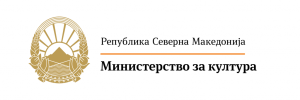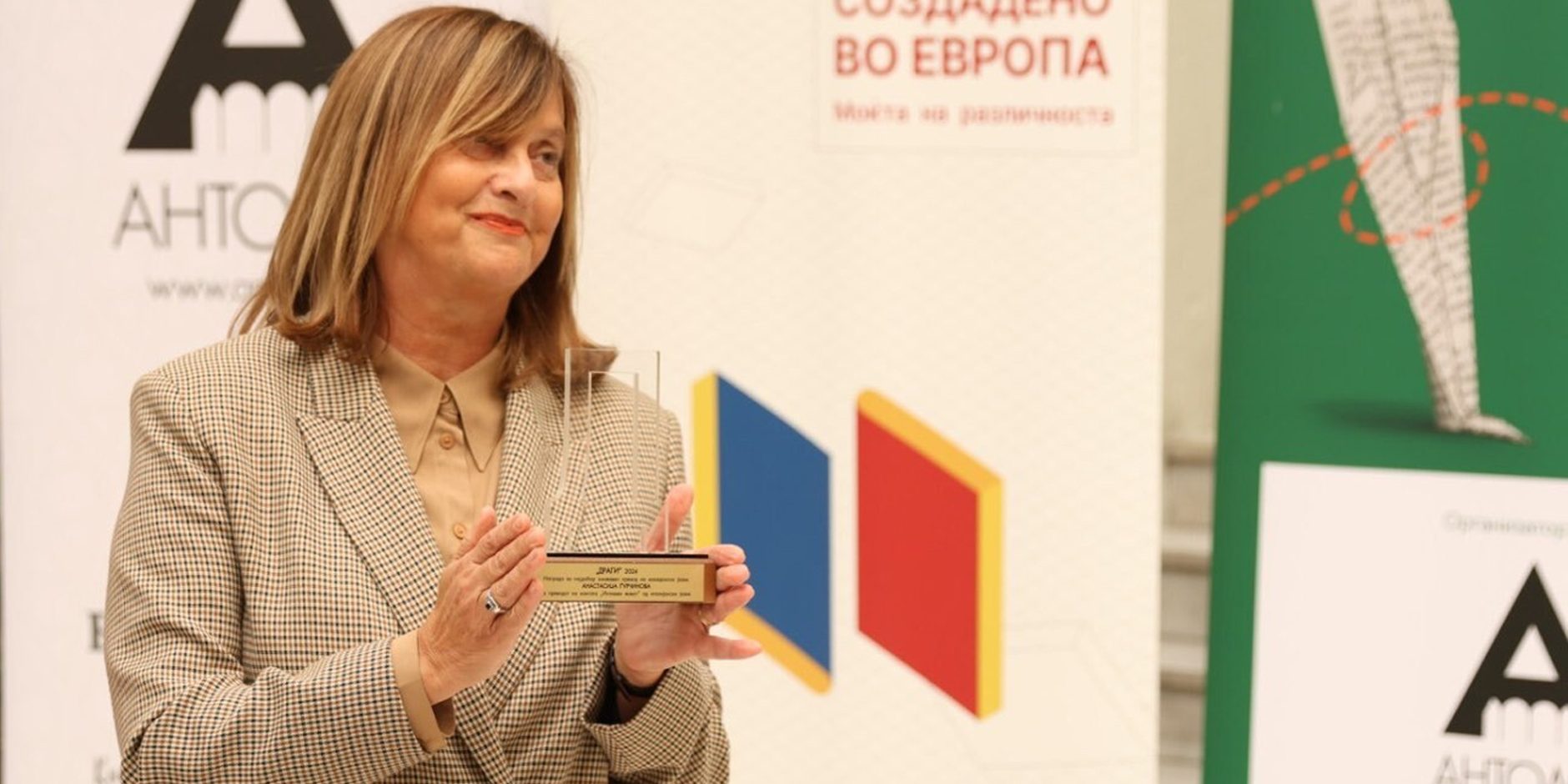I thank the committee from the bottom of my heart: Jana [Mihajlovska], Vladimir [Jankovski], Zorica [Nikolovska], thank you very much for the trust you have in my writing, I am touched. Of course, it is not easy to say something very smart now.
I want to thank my publishers. I am here for the second time. Last year with "Artkonekt" and this year with "Antolog". I thank them for nominating my books for this award, thus showing that they believe in my translation work, and me standing here, at the exam, for these quality, authoritative people to judge my translation.
I am very glad to receive the "Dragi" award, and now that word – dear – will be repeated several times and we will repeat it with great pleasure, right? That's why we established, in a way, the award, to remember our colleague who, on one hand, had such an impressive relationship - to translate Shakespeare, all the sonnets and plays, it sounds so terrible when I think about it, and on the other hand, he did it with such modesty and such ease, and did not allow us to look at him as an icon. And he wouldn't want us to talk about him as an icon today. I would like to mention Dragi as a colleague, whom we met here in the corridors very often, and will continue to be with us in these halls, in these corridors, here, and through this award, from whom I personally have several very important memories. He was not my professor, but he was my colleague, whom I turned to several times for advice. The advice he gave me and the marks he gave me on my first translations I will jealously keep to myself, they are too precious for me to share with a wider audience, they were really helpful and encouraged me, if I may say so, to not I give up this bumpy road. He knew the road was bumpy, but it was possible. He kept saying, "Look for it, look for it, look for it, you will find it. Dig into the word, no matter how hard it is, it will come out somewhere." And it's true, like in Benjamin's case, translation is a research job, you have to consult many friends, bother your family, constantly ask them about different variants, relatives, all the experts in various fields you know, in the city or abroad.
I did my first translations without the Internet. I started translating in the early 1990s, it was really a research work, from encyclopedias and professional books. Today, I must say that, in this digital age, the Internet helps a lot, it misleads sometimes, it requires verification, but it helps a lot.
I am very happy, Ekaterina [Babamova], Elisaveta [Popovska], Gjoko [Zdraveski], Irena [Jurčeva], I will be here to testify, in the awarding ceremony that I wish you as soon as possible and I am sure that you will receive it. But, being in such a nice company, I also wrote in the interview, that it is always fun to learn something from your translation laboratory, so let's exchange some secrets, even though we don't always tell them to each other. Some, as I said, even jealously guard them.
As I said, I'm glad that it's "Dragi", but I'm also glad that it's Niccolò Ammaniti, because I've translated several authors, but I'm loyal to Ammaniti, because I translated the first novel that was published in Macedonian, in 2004, the cultural novel "I'm Not Scared", the novel, after which Gabriele Salvatores made a film, and it became planetary famous, and, well, with my publisher, Žarko [Kujundjiski], we share this love and passion for Ammaniti, so when he found out that Ammaniti had a new novel, he immediately called me and asked for it to be translated this year.
By the way, Ammaniti was already on "Bookstar". In the pandemic year, we did an online interview, and I hope that even now he will be told that he is present at “Bookstar“ again, and maybe we will get him to come over in another year, because we have been inviting him for a long time. Ammaniti is very different in this book than the previous ones. "Anna" was awarded last time, during the pandemic, because he had, that prophetic thought, to write a novel about a pandemic and a virus, and it was not possible not to award Ammaniti during the covid-19 pandemic, so that I hope we will continue this conversation on another occasion and in his presence.
What can I say in the end: here, as our colleagues and teachers taught us, no matter how impossible and difficult and laborious it is, we do not give up on translation. I believe that literary translation is still possible. It seems impossible, but in the end, it is the only way in which people, countries, cultures talk to each other, make friends. And, for all I know, translators make it possible. In honor of the translators, I want to end this short speech. I would say that to all translators, the "humble and silent literary heroes in the shadows" as Paul Auster called them, who enable us this joy of reading foreign works, make us, as Rumena [Bužarovska] nicely said, from a small language, to communicate with the biggest cultures in the world, they make it possible for us, and they make them seem more significant and important at the same time, they make our language expand, to question, to move its borders, to forge, and, to mention Koneski: "language is forged in the forge of translation". And so, to all those translators, without any distinction, I dedicate this award.
Thank you.









